Meet the mothers leaving everything behind to flee Ukraine with their children
They have been forced to say goodbye to their husbands and make terrifying journeys across war-torn Ukraine in the hope of reaching safety with their children at the Polish border, David Cohen reports
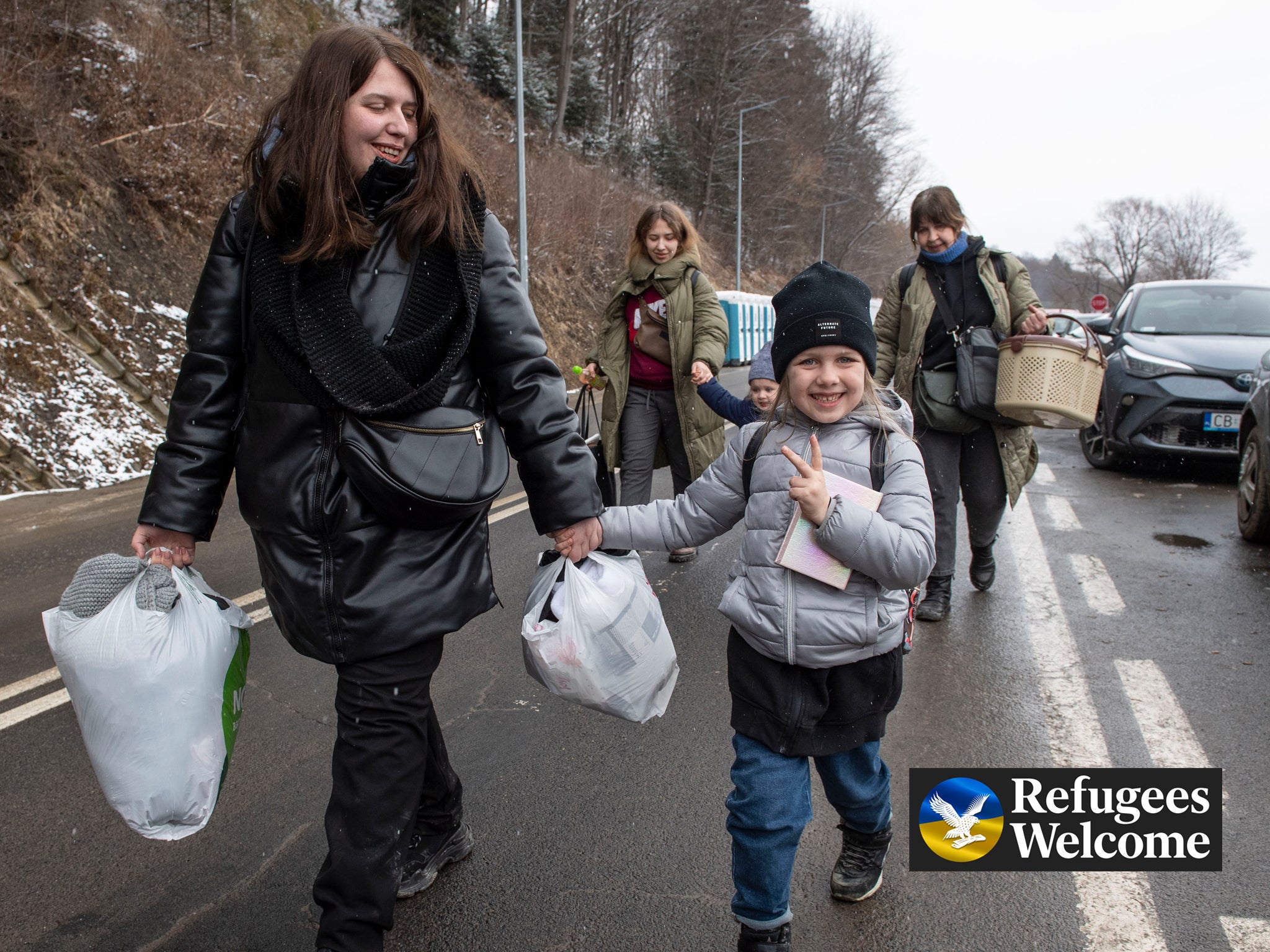
Your support helps us to tell the story
From reproductive rights to climate change to Big Tech, The Independent is on the ground when the story is developing. Whether it's investigating the financials of Elon Musk's pro-Trump PAC or producing our latest documentary, 'The A Word', which shines a light on the American women fighting for reproductive rights, we know how important it is to parse out the facts from the messaging.
At such a critical moment in US history, we need reporters on the ground. Your donation allows us to keep sending journalists to speak to both sides of the story.
The Independent is trusted by Americans across the entire political spectrum. And unlike many other quality news outlets, we choose not to lock Americans out of our reporting and analysis with paywalls. We believe quality journalism should be available to everyone, paid for by those who can afford it.
Your support makes all the difference.The scale of the challenge facing the exhausted Ukrainian mothers of young children who sought refuge in a makeshift marquee manned by aid workers on the Polish border at Kroscienko was unspoken but etched into every brow.
For mother of two Sasha Bubnovska, 28, the tent meant a brief moment of respite after a terrifying four-day journey to escape Irpin, a city in the north at the heart of some of the fiercest fighting, as well as an opportunity to steel herself for what lay ahead – for this was the first time in her life she had been out of Ukraine or travelled without her husband.
For Victoria, 31, also a mother of two and from Kyiv, it was a chance to share the desperate moment when it dawned on her four-year-old son, Vlad, that “going to the place with no bombs” came with the utter incomprehension of “having to leave his dad behind”.
And for Tanya Soroka, a 30-year-old mother of six whose ages range from just a few months to eight years old, the thought of coping with so many very young children without her husband’s support was simply overwhelming.
“I took them away because of the bombs and now we get here,” she said, slumped over a trestle table. “I take each stage as it comes. Otherwise you will not begin to believe what you have to do.”
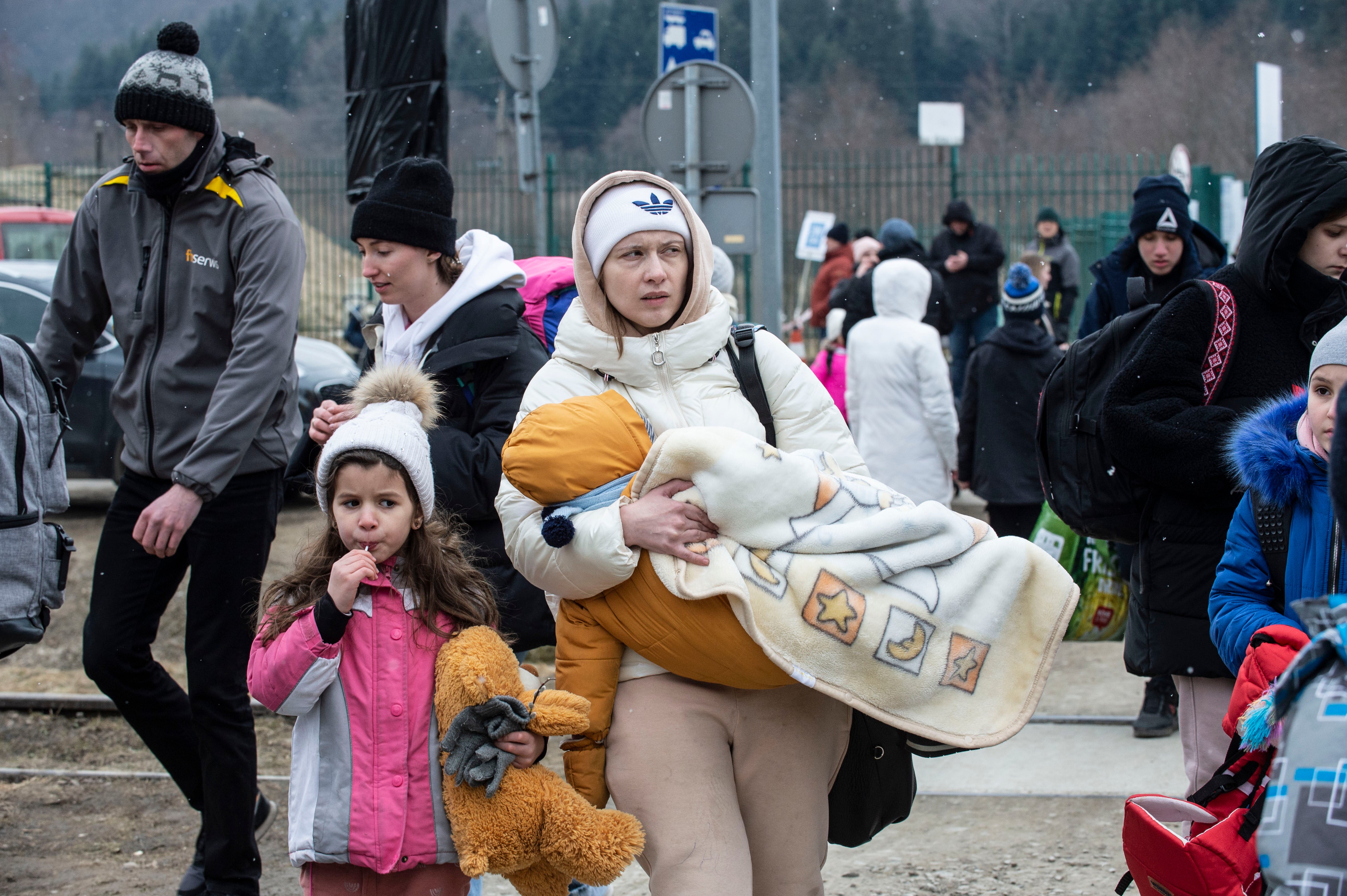
Over the four days I visited Kroscienko this week, a continuous stream of several thousand mothers with young children would use the long, thin heated tent as a temporary haven between crossing the border and getting bussed to a refugee reception centre, staying no more than a few hours.
It was the first time they could afford to relax, and many said it was the only time they had seen their children smile in days.
Most mothers kept to themselves but they told us of the dilemma they faced as to what to tell their children and how their kids had suddenly become “incredibly well behaved”.
Sasha, who balanced Mia, 2, and Sofia, 6, on her lap, said: “My children have mostly been calm, unusually calm. They have a sense that something very big is happening to us and that they have to do what they can to help by their behaviour. My older one is smart. I tell her the truth and talk with her about Hitler and World War II and so she knows what is happening.
The Independent is raising money for the people of Ukraine – if you would like to donate then please click here for our GoFundMe page.
So far our appeal has raised £126,000 for the people of Ukraine, but they need more, please give what you can to help support them.
“My little one has become afraid of loud sounds and cries at night because of the terror. At first I thought she was too young to grasp the situation but actually I think she understands everything. It was hard to make her do what I asked before; now she is super obedient.”
For Sasha, a primary school English teacher, the need to keep her children feeling contained while undertaking a journey through hell has been her driving force.
“We were one of the last families to leave Irpin,” she said. “My husband, Dima, has a car and we finally decided to leave the city after spending eight days in the basement of our house. I didn’t want to leave because I am very close to my father and he said he was not strong enough to travel, but he said to go, that he would stay and look after our houses and be fine.
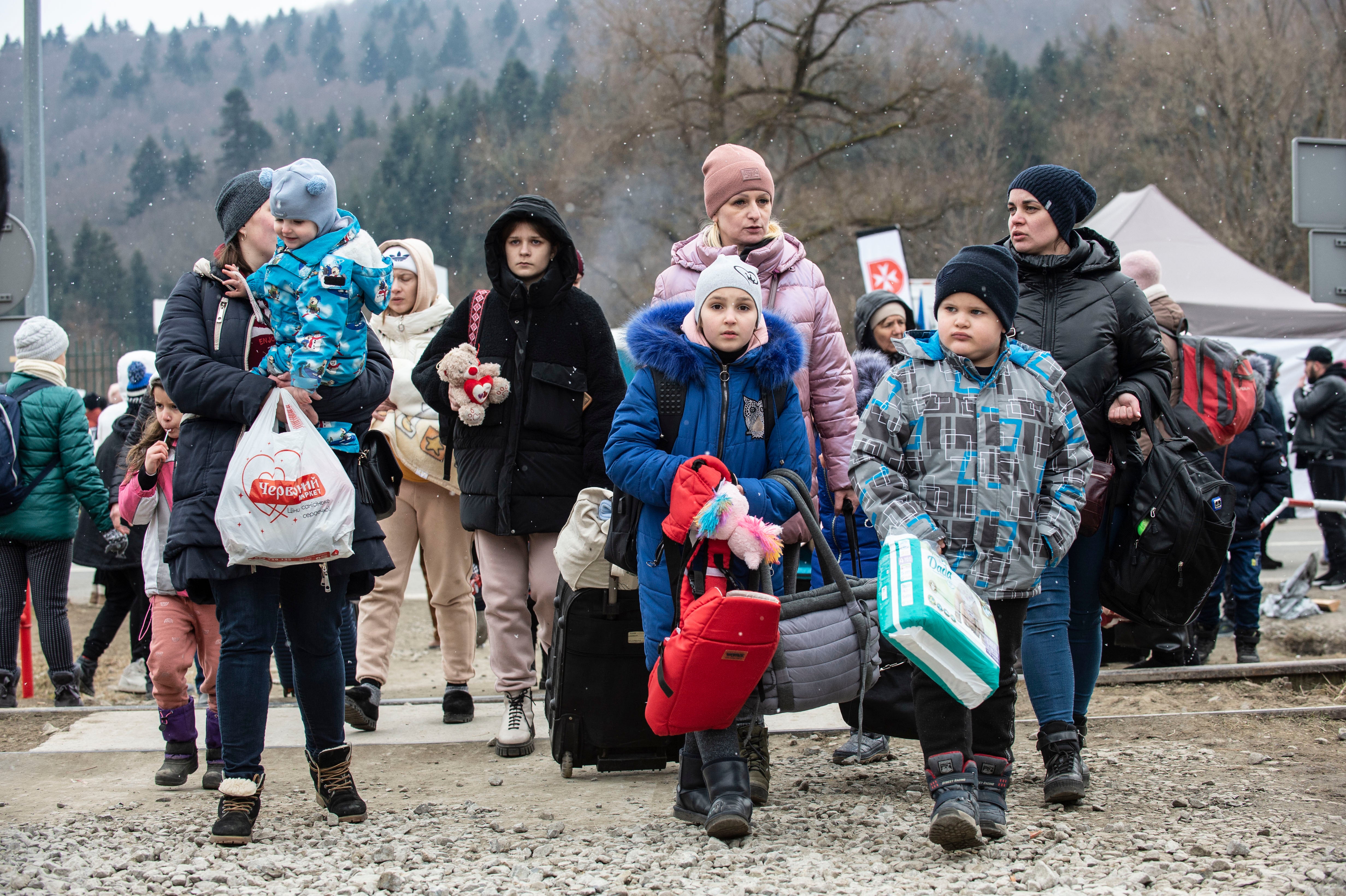
“I had a sense when I said goodbye to him that it might be the last time I saw him alive. He is 63 and he was crying, the first time in my life I have seen him cry – you have no idea how hard that was for me.”
Sasha’s eyes reddened as she explained that she had been unable to reach her father to see if he was safe for four days because with no electricity in Irpin, he would have been unable to charge his phone.
She said that the terror of their journey started almost as soon as they departed. “As we drove through the outskirts of Irpin, we came under heavy bombardment. We heard loud bangs and shooting very near, but my husband kept going. He said that if it got any closer we would have to leave the car and lie on the ground with our daughters under us.
“We were very quiet. When you hear the sound of something flying very close, you can’t scream. I was thinking about this woman we know who was killed with her children while trying to leave our city and I was talking in my head to God, asking him to get us to a safe place.”
The road was so full of checkpoints and people fleeing that it took them ten hours to travel 250 km and they decided to spend two nights holed up at a church along the way where they slept on the floor.
“We went at a pace that our children could cope with and we played cartoons and did drawings. I said to my daughter to try and draw something beautiful, like a blue sky and nature and the sun shining. I told her that when the war is over, we would all be walking in sunlight again.”
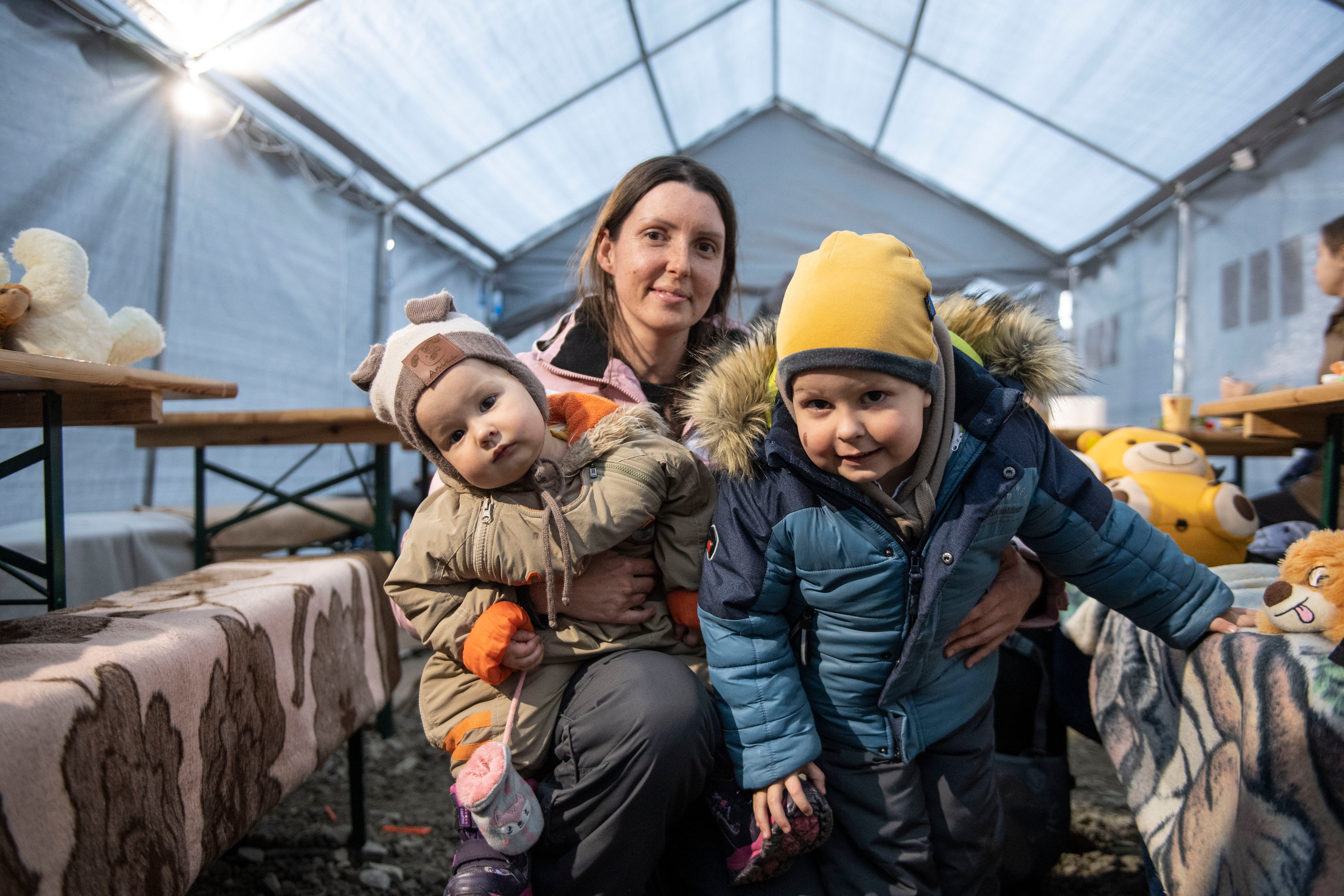
In Victoria’s case, the only way she and her children could leave Kyiv was by taxi, so she paid a driver 24,000 Ukrainian hryvnia (around £650) to get her to the border as fast as he could.
“We saw three bad accidents because people had been racing to escape and that held us up, but we got here in just over a day.”
As she spoke, the sound of wailing from Tanya’s three-year-old punctuated what was otherwise a remarkably calm tent.
Victoria’s four-year-old, Vlad, took the opportunity to offer Sofiia, our Ukrainian interpreter, a succession of sweets he had collected from the food table at the far end of the tent. Behind us, several children had passed out on camp beds.
The Independent has set up a petition calling on the UK government to be at the forefront of the international community offering aid and support to those in Ukraine. To sign the petition click here.
We want to get 200,000 signatures as soon as we can to help put as much pressure on the government as possible, please add your support today.
Others tended to their pets, with one stroking a pet hamster. Many of these children are so young they will thankfully never remember being in a makeshift tent on the freezing Polish border, but for the mothers themselves it was moment they would never forget.
Victoria said: “My husband and I have been trying for a third child. Now I am here and he is in Kyiv. I feel overwhelmed to be in a new country entirely on my own with my children and not knowing what will happen next.” Sasha said: “Before this war we had the happiest life. We love our home and our family and our city and we would go to cinema and restaurants and take our children to the park like normal people. We built our house 18 months ago and were waiting for wardrobes to be delivered. They were to be the last thing to finish the house.”

Sasha was determined to be strong and cope for her children. When I told her she was brave, she replied: “It’s not true. Actually I was crying all the time. This is the first time in two weeks I feel safe and my children start to laugh and run.”
There is a sense of gratitude, too, that these mothers express for the extraordinary humanitarian effort by the charities that have come to their aid.
Red Cross personnel manned the entrance to the tent and were on hand to help carry their bags through the border and offer medical aid and advice about onward travel.
They worked alongside volunteer Polish firemen and the charity Caritas, who ran the food table 24 hours a day and ensured continuous supplies of baby milk, baby food, sanitary pads, SIM cards, hot food and drinks.
The Red Cross is one of 13 charities supported by our Refugees Welcome appeal which today approached £300k together with Government match funding and the appeal of our sister paper, the Evening Standard.
Two Red Cross volunteers – Anna, 25, and Robert, in his fifties – said they had travelled with a group from Krosno, a town 140 km away, to stand in below-zero temperatures and offer “help where we can”.
I watched them lug suitcases and repair luggage, wheel women in wheelchairs and run to provide desperately tired mothers with a pram or a helping hand.
Suddenly Sasha got a call. “My aunt has arrived to take us to Krakow,” she said. She grabbed her bags and her children, flipped open the flap of the tent manned and went dashing through the snowy slush towards freedom.
“Stay safe,” she shouted back to me, as if I was the one in danger. She got in touch the following evening: “I want to share with you the best news of the day,” she said. “My dad and grandma are safe. I spoke with them a couple hours ago. I think it’s one of the greatest days of my lifetime. We are in Krakow now and we are soon going to Germany.”
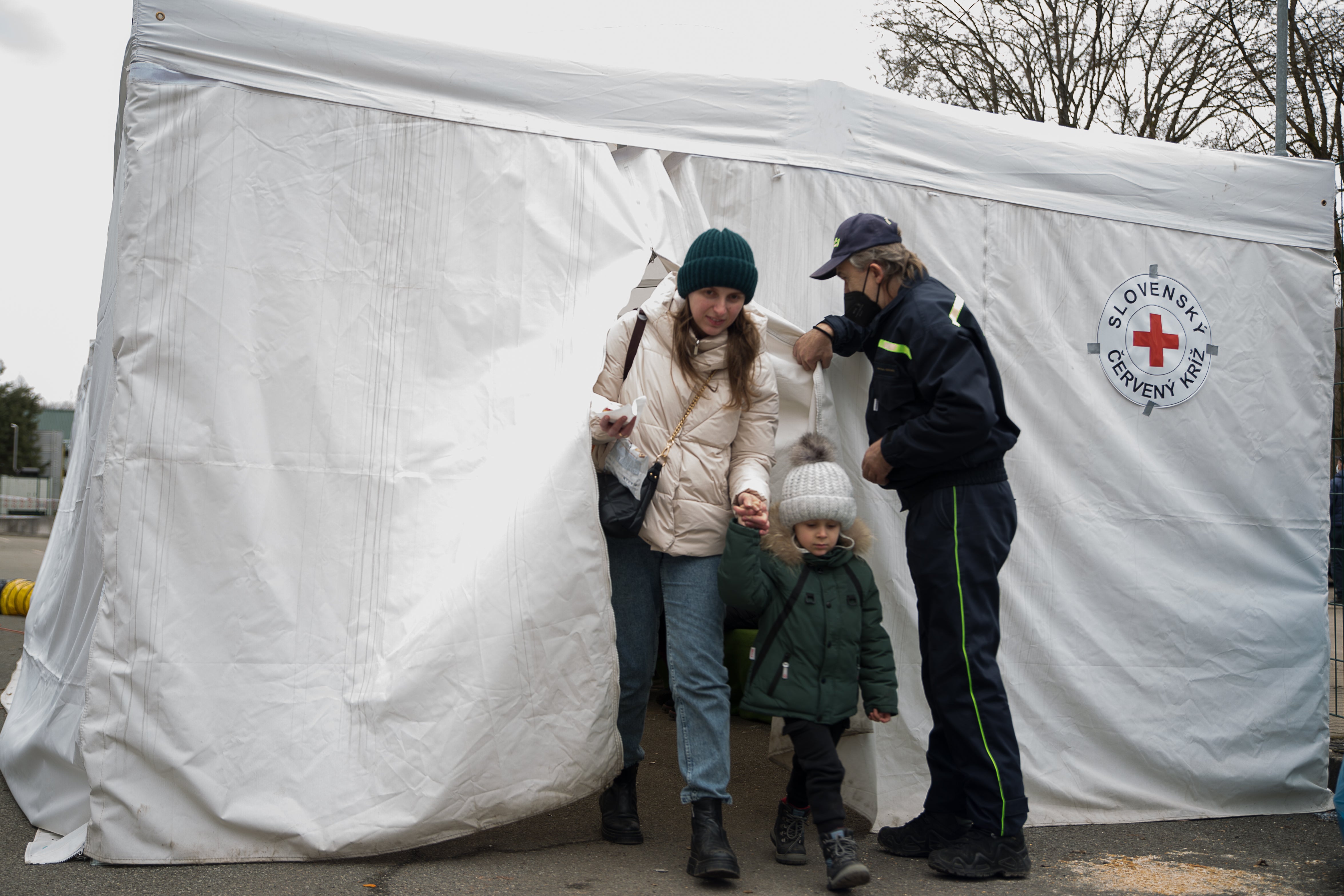
She proceeded to send me a video diary of her ordeal so far. It began with a clip of her walking in her garden when Russian bombs started falling and footage of them living in their basement for the first eight days of the war, then clips of her tearfully saying goodbye to her father and her house and finally footage of their four-day road-trip, including bedding down on the floor of a church.
She said: “This is the hardest time in my life but I am speaking out to the press because I want people to know the truth of what is happening to us. My husband’s brother lives in Russia and they were telling us that the bombs destroying our city are fake news – propaganda from our government. They live in Siberia. I think they are more weak than stupid. I have asked them to not write to us anymore. I said goodbye to my husband at the border just this morning. My last words were that I would bring him some sweets from abroad when I return. I tried to be light. He was silent. This is how it is for now. We have to be strong for each other, separate but together.”
Additional reporting and translating by Sofiia Sas
The Independent has a proud history of campaigning for the rights of the most vulnerable, and we first ran our Refugees Welcome campaign during the war in Syria in 2015. Now, as we renew our campaign and launch this petition in the wake of the unfolding Ukrainian crisis, we are calling on the government to go further and faster to ensure help is delivered. To find out more about our Refugees Welcome campaign, click here. To sign the petition click here. If you would like to donate then please click here for our GoFundMe page.
Join our commenting forum
Join thought-provoking conversations, follow other Independent readers and see their replies
Comments